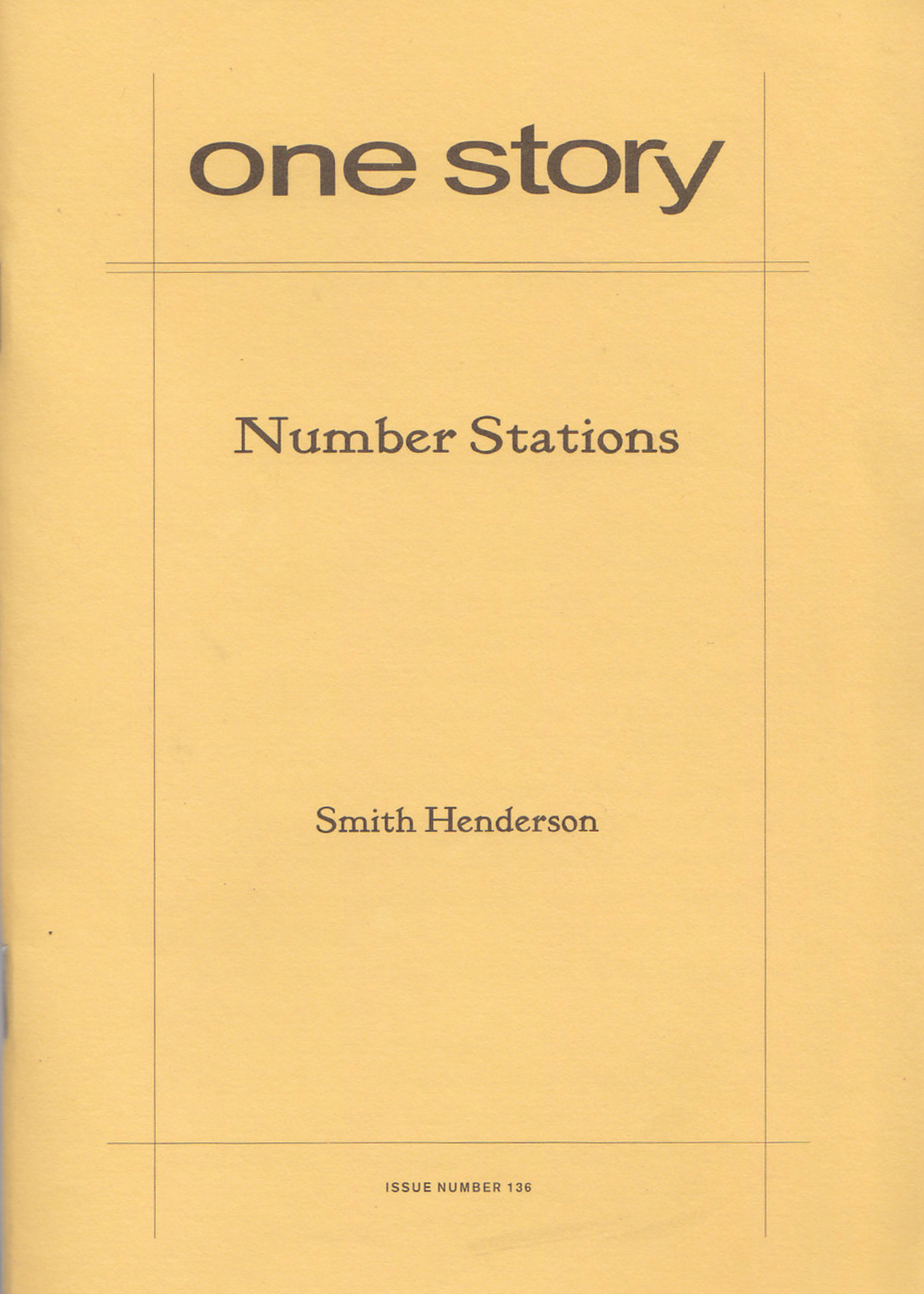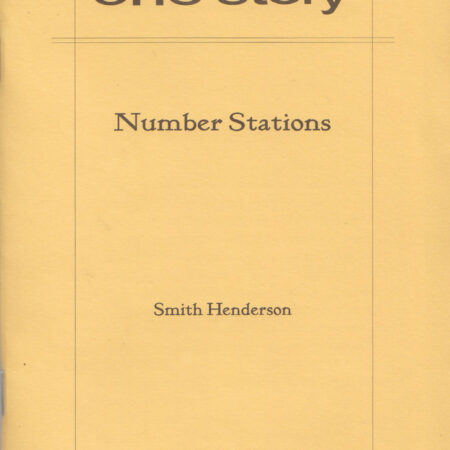
Number Stations
$2.50
20 in stock
Excerpt
Goldsmith’s mother took her own pictures of the ostrich. A man had led the bird to her door and kept it on a small chain. A sorry-looking sack of shit, she thought. The man and the bird both.
Her granddaughter caught sight of the thing and scooted outside, underneath it, and begged to climb on as soon as the man said he was selling rides. The bird dropped its head down to the girl and hung there like a pipe from under the sink, inspecting her. For five dollars the man would put her on it and take a Polaroid. He pointed to the camera slung around his neck and showed his mangled teeth in an approximate smile. The ostrich chuffed hot little clouds of breath.
“I see what this is,” Goldsmith’s mother said, holding closed her cardigan at her neck.
The man had taken off his cap in the manner of an older generation, holding it like reins. “I know Goldsmith,” he said. “I’m Bill. I work for him? Washing dishes?”
So this was the parolee her son had hired. She pulled the girl back inside. “I’m not paying you anything for anything,” she said.
Smith Henderson
Smith Henderson hails from Montana and has lived in central Texas on and off for the past decade, where he has been a prison guard, writer, and fellow at the Michener Center for Writers. A two-time finalist for the University of Texas Keene Prize for Literature, his fiction has appeared in American Short Fiction, New Orleans Review, Makeout Creek, and Witness, and has earned numerous honors, most recently a finalist nod for the Flannery O’Connor Award. His work will appear in the Emerging Austin Writers anthology from Dalton Publishing. A feature-film he co-wrote, “Dance with the One,” premiered at the 2010 South by Southwest Film Festival, which you can read about at www.dancewiththeone.com. He lives in Austin with his wife and two children and is currently at work on a novel, more stories, and another screenplay.
Q&A by Marie-Helene Bertino
- MB: Where did the idea for this story come from?
- SH: It’s hard to pinpoint exactly. I knew I wanted to write about number stations and then I read about this woman who got a space station video feed on her fancy baby monitor. I made ice cream for a time in Montana and wanted to set something in that place. My boss was named Goldsmith, though I’m sure his secrets were much more mundane. There was an ex-con who worked with me, and he did have the accident with boiling water, though I wasn’t there and I embellished it, I’m sure. The main scenario in the story was straight out of a Dr. Laura program, I’m afraid. This young woman called in and said, “My co-worker shared this terrible thing with me the other night and I don’t know what to do.” Give me a newspaper I’ll get you something out of it.
- MB: How long did it take you to complete this story?
- SH: The first draft of “Number Stations” was written a couple years ago. But it was pretty plotted out before hand. I hate writing first drafts. All that “discovery” nonsense that people talk about—it just doesn’t work for me. I need to muse for about six months, write for a week or two, and then re-draft the thing until it hurts. I think a good story usually takes about year to write. But you can do several at a time, and wind up with a pretty good number in that year.
- MB: What is the deal with ostriches, do you think?
- SH: Well that started from the radio too. Some AM drive-time comedian riffing about this guy who came into his neighborhood offering donkey rides. But why the animal needed to be an ostrich in this story is a good question. I had some initial qualms to be sure. That it’d be quirky. “Look at the silly ostrich in Montana! That zany place! What will they think of next?!” Ugh. But the ostrich just fit the visual poetics of the piece, if you’ll suffer the expression. For some reason that I still don’t quite understand, the story immediately traded in all this imagery of water, ice, and snow, and things that remind you of water, ice, and snow. Ice cream. Dandelions. And the ostrich, shaped as that ridiculous creature is, just fit. Still, I didn’t really know how to use the animal until my wife read the second of third draft of the story, chewed me out for a confusing timeline, literally chopped up the story into little sections, put them in order, and said, “Follow the ostrich!” So the spine of the story became the pursuit of the bird. It’s a maguffin really.
- MB: I developed a crush on Van after several reads of the story, and those wonderful hips. Did you have a crush on Van, too? Did you have a crush on any of these characters?
- SH: I’m pleased to hear that. I was shooting for “crushable” with Van. For serious. He’s interesting and does cool stuff, is completely worthy, is romantic, but he’s just not quite making it all the way into Emily’s heart. That’s the breaks, I suppose. I felt like the situation had to be unfair to him—so maybe he’s more sympathetic to the reader because he’s getting jerked around by his gal. But he’ll be fine. He speaks Spanish and tries to save glaciers for chrissakes. I don’t think I had a crush on anybody. I’m fond of Bill’s stoic determination, Goldsmith’s withering guilt. I have to say that your notes on the story prompted me to write a little more about Emily, and her future, which made me feel rather sorry for her. I guess I pity my characters, the poor bastards.
- MB: Emily makes Van “helpless, helpless, helpless...” Is this a reference to the Neil Young song “Helpless?” Are you a fan? If not, are you aware that there is a Neil Young song called “Helpless” that repeats that word three times? You should totally iTunes it.
- SH: Does he perform or is he just a songwriter? I just know the version where this high-voiced old woman sings it. I kid. I love Neil Young. Looks like a sasquatch and sings like an angel. To answer your question, I’m sure it didn’t bother me to have the allusion in there, but I think I do the triple thing in another place in the story. The thing is, you have to use three words in repetition. You can’t say a word twice or people will assume it’s a typo, and with four you’re stuttering. “Helpless, helpless, helpless” is just right. Neil Young is a genius!
- MB: James Scott, one of our readers, was the one who pulled this story out of the slush pile and sent it to me. When I read it, I immediately knew why it struck him. He and I are both Cormac McCarthy fans. The language of this story to me is new and invents new phrasing, like McCarthy’s work. Are you a fan of his? If not, what influences your choices in phrasing in this piece?
- SH: Of course we’re all fans of McCarthy. He’s a grand stylist, up there with Saramago, Nabokov, Flaubert, Joyce, Faulkner...I just try and write something I think I’d like to read, and the things I like to read usually surprise and interest me in a couple different registers. It’s a very flattering comparison. Thank you.
- MB: The omniscient viewpoint is surprisingly underused in contemporary fiction. Did you always know the piece would dip into the heads of all of its characters, or was it originally told from one viewpoint?
- SH: I knew that Goldsmith’s guilt would cause him to behave in ways that would attract Emily, and that she wouldn’t know why for a while. I knew that there would be an ex-con, and that his experiences would tie in somehow. Once I had three interior lives that needed attention, it was an obvious choice to go third-person omniscient. It actually opened the story up to a few more characters.
- MB: One of the effects created by the omniscient viewpoint is an even, non-judgmental tone. Everyone has a voice, so to speak. So, we are able to, for instance, have the full and complicated swath of dual feelings Emily has toward Van and Goldsmith, as opposed to a more simplistic crush-on-employer relationship that may have resulted from a more limited point of view. By the same token, no character is helped by a more limited point of view; they are shown; warts and all. Is it important to you to not judge or help your characters, to let them be as flawed as they are?
- SH: Again, thanks for the compliments. I don’t think I’m capable of judging these characters, per se. Flaws are good because they interesting. As I see it, my duty is to be interested in what I’m writing in the hope that my enthusiasms will become the readers’ enthusiasms, at least for a time. Judgments are the moment the subject becomes uninteresting. That’s why the moral of the story comes at the end. It’s the only place any reader ever could stand it.
- MB: I know you work in film in Austin and recently had a movie premiere at South by Southwest Film Festival. Is there ever a time while writing a screenplay that a rule of writing fiction interferes and has to be neutralized, or vice versa? In other words, is there a rule in one genre that doesn’t translate or is directly opposite in the other? Are there rules that are the same?
- SH: Yes yes yes. People in the biz are really touchy about those flawed characters. Even though drama proceeds necessarily from characters making mistakes, you will constantly hear about likeability. Your protagonist can’t be doing something for money—she has to need the money to get her cat chemotherapy. It’s pretty much the opposite of what I was just saying. They need to be secure in the knowledge that the protagonist is good, and that often runs counter to my instincts in fiction. I’m not even sure that it’s true in movies, but it is probably true in the business of movies. Heroes give better returns on investment capital. In any case, you have to be sensitive to whatever the concerns are, because a script is necessarily collaborative. Unless you’re a billionaire.
- MB: What is the best bit of advice about writing you have ever received?
- SH: I’ve known so many fine writers who have just gotten discouraged and hung up their spurs, that it’s clear that just keeping at it takes more than talent, or even a reasonable amount of patience. I don’t know if anyone has ever specifically articulated this to me, but it’s evident from all the great working writers I’ve had the pleasure to know that writing is their favorite thing to do.
- MB: What are you working on now?
- SH: A novel about a social worker in Montana in the 1980s, a screenplay about a guy who sells insurance to criminal syndicates, and a short story about brothers who rob houses they know will be empty because the occupants are at funerals/getting buried. You know, comedies.
